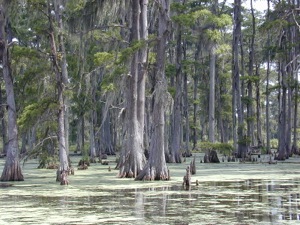Difference between revisions of "Swamp"
(Created page with 'File:lighterstill.jpgright|frame ==Origin== perhaps alteration of [http://nordan.daynal.org/wiki/index.php?title=English#ca._1100-1500_...') |
m (Text replacement - "http://" to "https://") |
||
| (One intermediate revision by the same user not shown) | |||
| Line 2: | Line 2: | ||
==Origin== | ==Origin== | ||
| − | perhaps alteration of [ | + | perhaps alteration of [https://nordan.daynal.org/wiki/index.php?title=English#ca._1100-1500_.09THE_MIDDLE_ENGLISH_PERIOD Middle English] ''sompe'', from Middle Dutch ''somp'' morass; akin to Middle High German ''sumpf'' marsh, [[Greek]] ''somphos'' spongy |
| − | *[ | + | *[https://en.wikipedia.org/wiki/17th_century 1624] |
==Definitions== | ==Definitions== | ||
*1: a wetland often partially or intermittently covered with [[water]]; especially : one dominated by woody vegetation | *1: a wetland often partially or intermittently covered with [[water]]; especially : one dominated by woody vegetation | ||
| Line 9: | Line 9: | ||
*3: a [[difficult]] or troublesome situation or subject | *3: a [[difficult]] or troublesome situation or subject | ||
==Description== | ==Description== | ||
| − | A '''swamp''' is a [ | + | A '''swamp''' is a [https://en.wikipedia.org/wiki/Wetland wetland] that is [[forest]]ed. Many swamps occur along large [[rivers]], where they are critically dependent upon natural [[water]] level fluctuations. Other swamps occur on the shores of large [[lakes]]. Some swamps have [https://en.wikipedia.org/wiki/Hammock_(ecology) hammocks], or dry-land protrusions, covered by [https://en.wikipedia.org/wiki/Aquatic_vegetation aquatic vegetation], or vegetation that tolerates periodical inundation. The two main types of swamp are "true" or [https://en.wikipedia.org/wiki/Freshwater_swamp_forest swamp forests] and "transitional" or [https://en.wikipedia.org/wiki/Shrub_swamp shrub swamps]. In the boreal regions of Canada, the word swamp is colloquially used for what is more correctly termed a [https://en.wikipedia.org/wiki/Bog bog] or [https://en.wikipedia.org/wiki/Muskeg muskeg]. The water of a swamp may be fresh water, [https://en.wikipedia.org/wiki/Brackish_water brackish water] or [https://en.wikipedia.org/wiki/Seawater seawater]. Some of the world's largest swamps are found along major [[rivers]] such as the Amazon, the Mississippi, and the Congo. Swamps can be found on all continents except Antarctica with the largest swamp in the world being the Amazon River floodplain, which is particularly significant for its large number of fish and tree species.[https://en.wikipedia.org/wiki/Swamp] |
[[Category: Ecology]] | [[Category: Ecology]] | ||
[[Category: Earth Science]] | [[Category: Earth Science]] | ||
Latest revision as of 02:35, 13 December 2020
Origin
perhaps alteration of Middle English sompe, from Middle Dutch somp morass; akin to Middle High German sumpf marsh, Greek somphos spongy
Definitions
- 1: a wetland often partially or intermittently covered with water; especially : one dominated by woody vegetation
- 2: a tract of swamp
- 3: a difficult or troublesome situation or subject
Description
A swamp is a wetland that is forested. Many swamps occur along large rivers, where they are critically dependent upon natural water level fluctuations. Other swamps occur on the shores of large lakes. Some swamps have hammocks, or dry-land protrusions, covered by aquatic vegetation, or vegetation that tolerates periodical inundation. The two main types of swamp are "true" or swamp forests and "transitional" or shrub swamps. In the boreal regions of Canada, the word swamp is colloquially used for what is more correctly termed a bog or muskeg. The water of a swamp may be fresh water, brackish water or seawater. Some of the world's largest swamps are found along major rivers such as the Amazon, the Mississippi, and the Congo. Swamps can be found on all continents except Antarctica with the largest swamp in the world being the Amazon River floodplain, which is particularly significant for its large number of fish and tree species.[1]
